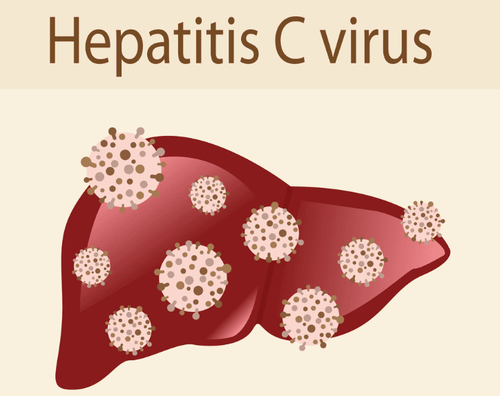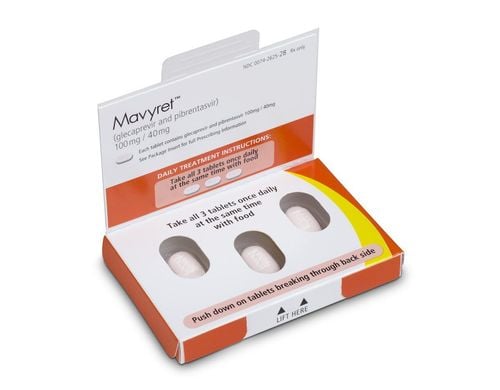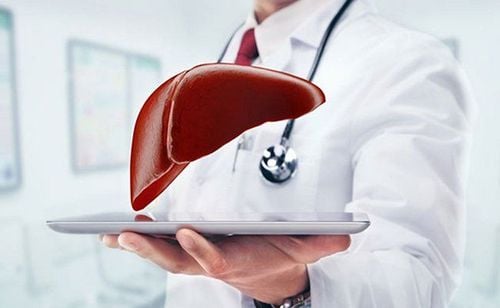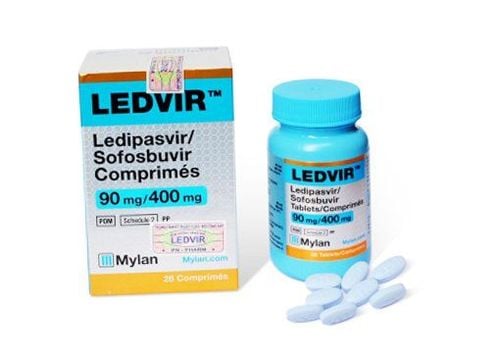This is an automatically translated article.
The article is professionally consulted by Master, Doctor Nguyen Tung Hoanh - Department of Resuscitation - Emergency - Vinmec Nha Trang International General Hospital.If you have been diagnosed with hepatitis by your doctor, you need to have tests done to see how much inflammation is there and whether you have chronic hepatitis or acute hepatitis, because there are many types of hepatitis with different causes. different diseases.
1. Types of chronic hepatitis and acute hepatitis
The type of virus that causes hepatitis will directly affect the severity of the disease and how long the virus lasts. Here is a list of acute, chronic hepatitis, including:Hepatitis A: You can get the virus if you eat or drink anything that has the virus on it. This is the virus that poses the least risk because people infected with the hepatitis A virus usually clear up on their own after a certain period of time. Even so, up to 20% of people with hepatitis A develop severe symptoms that require hospitalization for treatment. A vaccine is now available to prevent hepatitis A. Hepatitis B: Hepatitis B is spread in many ways. You can get the disease by having sex with someone who is sick or by sharing needles. The virus can also be passed from mother to child. A small percentage of people with hepatitis B can pass it on to others even if their symptoms go away. Hepatitis C: You can get the hepatitis C virus from contact with contaminated blood or needles, or from getting a tattoo. People with hepatitis C often have no obvious symptoms or may have only mild symptoms. However, some people infected with the hepatitis C virus are at risk for cirrhosis. Hepatitis D: occurs only when you are infected with hepatitis B. It tends to make the condition worse. Hepatitis D can be passed from mother to child or through sexual contact. Hepatitis E: mainly spread in Asia, Mexico, India and Africa. A few appear in the US and are usually people from countries with outbreaks. As with hepatitis A, you can get the hepatitis E virus through eating or drinking things that have been contaminated with the virus.

Viêm gan C ít có nguy cơ bị xơ gan hơn
2. Causes of hepatitis
Several factors put you at high risk for hepatitis A, such as:You have direct contact with people who have hepatitis A Traveled to a country with a high rate of hepatitis A infection Have been in contact close contact with someone who has traveled from a country with a high infection rate Same-sex sex substance use clotting factor disorders You work with primates. The following groups should be tested for the hepatitis B virus:
People born in areas where HBV is endemic Homosexuality Intravenous drug users (both current and former users) Anyone with HIV chronic kidney disease Pregnant women Family members and sexual partners of people infected with HBV (even if sex happened only once) Having sex with more than one person within 6 months People who take drugs that weaken their immune systems. People with hepatitis C Babies born to mothers with HBV. For hepatitis C, CDC recommends a blood test if the following are present:
You had an organ transplant or blood transfusion before July 1972. You received blood or an organ transplant from a donor who was later diagnosed with the disease You have had an injection, even just once, many years ago You have received a used blood product to treat blood clotting problems before 1987 You were born between 1945 and 1965 You were on long-term dialysis You have signs or symptoms of hepatitis You have HIV You have been on dialysis HCV exposure You have a blood test that detects long-term liver damage called ALT (alanine aminotransferase level) Babies born to HCV-positive mothers. On the other hand, routine hepatitis screening is generally not recommended unless you have symptoms or signs (such as blood tests that are associated with an abnormal liver condition).
3. Symptoms of hepatitis
Often in the early stages of hepatitis, you will not be able to recognize it because there are no symptoms or there may be no accurate diagnosis because the disease often has flu-like symptoms. Accordingly, the most common symptoms in people with hepatitis include:Loss of appetite Fatigue Mild fever Muscle or joint pain Nausea and vomiting Abdominal pain. Some people have other problems, such as:
Dark urine Light colored stools Jaundice Itching Dizziness or coma. You should be checked by your doctor if you have any signs of hepatitis. If you don't get treatment, you're at increased risk of cirrhosis, which is a serious damage to the liver. If a friend or family member has the disease, you should also be tested. There is a high chance that you may also be infected.
You need to be on the lookout for symptoms of hepatitis if you are traveling to a country where the disease is common. Contact your doctor if you think you are showing any signs of illness.

Vàng da là triệu chứng điển hình của viêm gan
4. Diagnosis and treatment of hepatitis
If you have symptoms or signs of viral hepatitis, your doctor will order a blood test to check for the presence of antibodies. If you have hepatitis B or C, more blood samples may be needed later on because even if your symptoms are gone, you need to be checked for complications and to determine if your condition has progressed from acute (infected within the last six months) to chronic (virus persists for more than six months). Most people with hepatitis have no symptoms at all or have no specific symptoms; Therefore, viral hepatitis is often referred to as a silent disease.Your doctor may also ask you to take a liver biopsy, or tissue sample, to determine the extent of liver damage. A biopsy is usually done by inserting a needle into the liver and removing a piece of tissue, which is then sent to a lab for analysis.
Treatment for viral hepatitis depends on the type of virus causing it and the stage of infection. Over the past few years, treatments for both hepatitis B and C have become available. Many other treatments are being studied. If you have severe hepatitis, you may need treatment by a hepatologist or gastroenterologist, who specializes in liver diseases. You do not need to be hospitalized unless you are unable to eat or drink or are vomiting.
Hepatitis A usually requires minimal treatment and your liver usually heals within 2 months. Although vaccination can prevent you from getting hepatitis A, once you have it, you can't get it again.
You may also be prescribed drug treatment for hepatitis B and C. Recently, the standard treatment for chronic hepatitis C is a course of peginterferon plus ribavirin for people with genotypes 2 and 3, and peginterferon plus ribavirin plus protease inhibitor for people with genotype 1. These treatments have been shown to be effective in 50% to 80% of people infected with hepatitis C but side effects are difficult for people to tolerate.
Current treatment for hepatitis revolves around direct-acting antivirals (DAAs). These drugs are highly effective for most people with hepatitis C, do not have interferon, and often do not have ribavirin. This means that these drugs usually have fewer side effects. Treatments are often simpler, involve less medication, and last for a shorter period of time. DAA is available as a single drug or in combination with other drugs in a single pill. Elbasvir -grazoprevir (Zepatier), ledipasvir - sofosbuvir (Harveston) and sofosbuvir velpatasvir (Epclusa) and once daily combination medication. Depending on the type of hepatitis C infection, they can usually be cured in 8 to 12 weeks.
If you are pregnant, your doctor will check you for hepatitis B; If you have the virus, your baby will be given immunoglobulins and a hepatitis vaccine. This will help protect your baby from viral infections. In addition, if the mother has active HBV, antiretroviral therapy should be given during the first trimester of pregnancy.
Hepatitis E can be fatal to a pregnant woman during the third trimester of pregnancy, and if the mother has hepatitis B, the baby is more likely to get it at birth.
If you have hepatitis, viral or non-viral, in the acute phase (occurred within the last six months), do not drink alcoholic beverages to avoid overloading the liver, making the condition worse. liver damage is more severe. Also, if your sex partner has hepatitis, especially if you have hepatitis B, you're also at increased risk. Hepatitis C is very difficult to transmit through sexual contact, unless there is contact with the blood of an infected person. Most adults will make a full recovery from acute hepatitis A and B within six months.
Hepatitis is a dangerous disease and leaves complications, but the signs of the disease are not clear, so most people are subjective. However, health experts recommend that when the family has a history of hepatitis as well as those who regularly drink alcohol, they should have regular liver and biliary health checkups.
Please dial HOTLINE for more information or register for an appointment HERE. Download MyVinmec app to make appointments faster and to manage your bookings easily.
Article referenced source: Webmd.com












